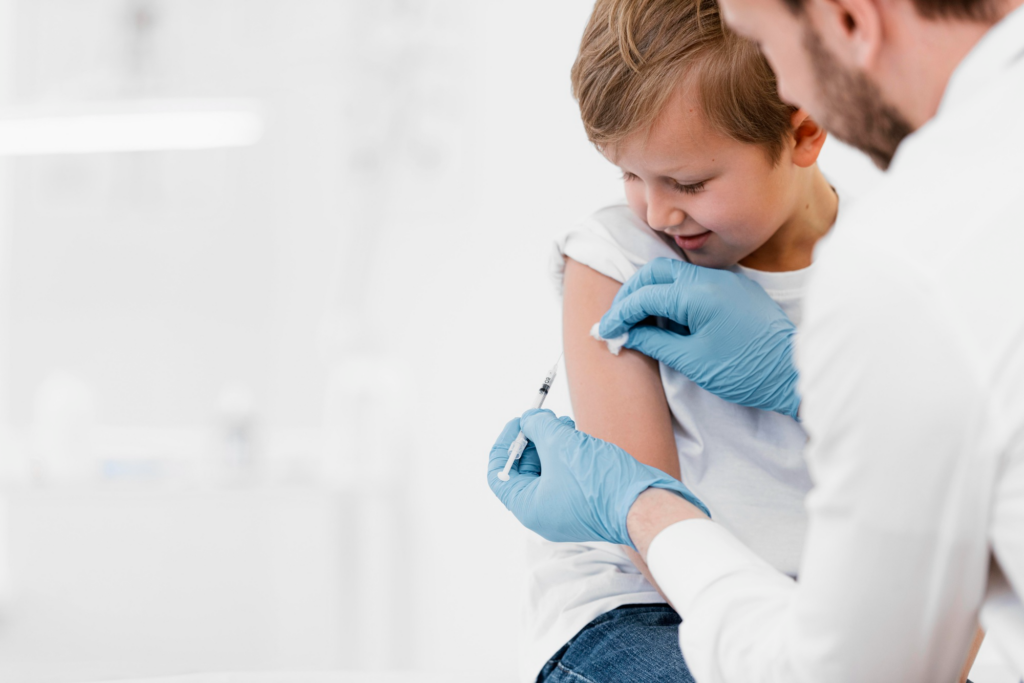Getting vaccinations on time in India keeps kids safe and healthy. These helpful shots prevent children from catching dangerous diseases like measles. When vaccines are done on schedule, their protection works best to help fight illnesses. In many places, healthcare is hard for families to find, but vaccines are easier to get and very effective. Schools often ask for vaccination records, so keeping up with shots is important.
Vaccination plays a big role in keeping everyone healthy and strong. It’s not just about one person, it keeps whole communities safer. Vaccines help stop diseases from spreading, meaning fewer people get sick or need a doctor. Serious illnesses like smallpox have been stopped because of vaccines around the world. They really help to keep our hospitals less crowded and our families safer too.
Understanding Vaccines: Science and Necessity
Vaccines help your body fight off diseases by getting it ready. They contain pieces of germs that are either dead or are not strong. These cannot make you sick and help your immune system. Your body gets trained to fight the disease if it encounters it later. This training acts as an early practice for your immune system, teaching it to protect you better against illness.
Vaccinating kids is very important in preventing common diseases in India today. Diseases can harm children, leading to severe illness or even death sometimes. Kids tend to catch infections easily because their defenses aren’t quite up there yet. Hence, they need the booster protection that vaccines offer them early on. In India, kids should get vaccines for tetanus, diphtheria, whooping cough, measles, and polio. To stop these diseases, it’s crucial that kids stick to their vaccine timetable.
Vaccines don’t just shield the person taking them; they safeguard the community, too. When most people get shots, there’s less chance for germs to hop around easily. This idea is like a shield for the whole group, called herd immunity. Even folks who can’t get vaccinated can be safe this way since trouble can’t easily jump from one person to another in a well-vaccinated group. Communities benefit widely thanks to everyone sticking with their vaccines against germs.
Navigating the Indian Vaccination Schedule
India’s universal vaccination schedule helps parents know when to get shots. Babies start getting vaccines as soon as they’re born. Vaccines target diseases such as polio, hepatitis, and tuberculosis. The schedule updates to tackle new health threats quickly.
From birth, babies receive important vaccines like BCG, oral polio, and hepatitis B. When they’re 6, 10, and 14 weeks old, they get other vital shots. These include DTP, hepatitis B, and Hib vaccines. As they grow older, more vaccines protect them from measles-mumps-rubella. Remember, booster shots help maintain health defenses well.
Being ready for a vaccine appointment makes it easier for everyone. Have the vaccination card handy with all details on shots done and due. Dress kids in loose clothes for quick access to arms or legs. Explain calmly what happens during a vaccine visit to ease worries. Stay at the clinic a little after getting the shots just in case. Bringing a toy might help too and after the visit celebrate to make them happy.
Dispelling Vaccine Myths and Misunderstandings
Many people believe myths about vaccines which leads to confusion. Some think vaccines can cause diseases they prevent, but that’s false. Another myth suggests natural immunity is better than vaccines.
This belief makes children vulnerable to severe illnesses and risks their health. Fear of side effects runs high though usually they are mild and brief. These misunderstandings lead to some refusing vaccines, fueling disease spread and outbreaks. It’s good to seek facts from real sources like doctors, not gossip.
Science has clear evidence showing vaccines are both safe and work. They contain tiny parts of germs that cannot cause illness. Instead, they help build immunity without needing to fall ill first.
Fears about vaccine ingredients have been proven wrong over time by experts. Small amounts of materials like mercury in vaccines are harmless. Vaccines go through strict tests before they reach public hands.
These checks ensure they meet safety rules and work as promised. Medical experts and government bodies verify vaccines’ safety time and again.
Understanding vaccine truths helps families make smart decisions for their kids. Parents should consult health pros to get honest, reliable information.
Info provided at health clinics or online from government sites is dependable too. Sharing factual stories and positive vaccine experiences raises awareness broadly.
Schools and community events can host vaccine talks to spread knowledge easily. When knowing the facts, parents feel empowered in vaccinating their children.
Supporting groups focused on vaccination awareness helps circulate true information further.
Cultural and Societal Influences on Vaccination
Cultural beliefs can shape the decisions people make about vaccinations. They might prefer traditional healing and be careful with newer methods. Leaders in the community hugely impact their views on vaccines. Language barriers can prevent clear understanding of vaccine importance. These factors sometimes cause parents to skip necessary vaccinations, placing kids at risk. Reaching communities respectfully can help build acceptance of modern health practices.
Communities working together effectively increases vaccine rates. Tailoring informational campaigns to different cultures improves understanding and acceptance. Conversations with trusted community leaders create confidence around vaccinations. Free access to vaccines through government programs boosts public willingness to vaccinate. Mobile clinics can reach those far from central healthcare hubs, breaking down barriers. Sharing stories from respected figures can encourage more people to get vaccinated. Open dialogues within the community promote trust and eliminate doubts about vaccines.
Providing a place for open discussions helps cover questions about vaccination. Visual aids simplify complex topics, making information more digestible. People appreciate clear explanations they can easily repeat back when asked. Cultural programs involving medical professionals foster openness and curiosity. Community health workers are crucial in encouraging parents to vaccinate their kids. These workers are trusted by families and help navigate vaccine hesitancy confidently. As families consistently learn, cultural acceptance of vaccines strengthens over time.
Preparing Your Child for Stress-Free Vaccinations
Vaccination time can be tough for kids, but preparation helps. Start by explaining why getting a shot is important for staying healthy. Use simple words like, “Shots stop bugs from making us sick.” When children know how the vaccination in children works, they may feel better.
Parents should talk about their vaccine experiences in ways kids understand. Share stories about times you got shots too and felt a little nervous. Tell them that the doctor and nurse are nice and there to help. Comfort them with a favorite toy or by holding hands during the appointment.
Plan the appointment when your child is neither tired nor hungry to avoid more stress. Make sure they wear clothes with loose sleeves that are easy to roll up. Think of using breathing techniques or even starting a fun game to keep them distracted during the shot. Plan a small celebration like going to the park for more happiness after their vaccination.
The Power of Vaccination in Building Herd Immunity
Vaccinating kids is more than keeping one child healthy. When most people get vaccinated, diseases can’t spread easily. This community protection helps everyone, especially those who cannot get shots.
Getting kids vaccinated keeps our society healthy and strong. It stops diseases from spreading fast and damaging communities. With more vaccinations, hospitals won’t get overwhelmed, and families stay safe from illness.
High vaccination rates are key to protecting society as a whole. They ensure kids grow up in a safe environment, free from many illnesses that once were common. A vaccinated society means a healthier future for all.
Skipping Vaccinations: What’s at Stake?
Missing vaccinations can lead to serious health risks nowadays. Children without their shots can catch illnesses that hurt them badly. Communities face outbreaks when children skip vaccines consistently.
Unvaccinated crowds help diseases spread more quickly and easily, causing threats to medical services, stressing out hospitals and clinics during major outbreaks. Unexpected illness costs families more money to get treatment than they planned. Schools might close or struggle when disease outbreaks happen, causing education delays.
Getting every shot on time greatly helps public health efforts thrive. We see fewer diseases every year when vaccination schedules are followed properly. Communities feel safer and progress faster without fear of past diseases coming back.
Conclusion: Making Informed Vaccination Decisions
Vaccinations are vital to keeping people and communities safe from diseases. They are especially crucial for children, providing a barrier against illnesses they can’t fight alone. By looking at the bigger picture, it’s clear that vaccines are essential for everyone.
Parents have the power to decide what’s best for their children, and this power grows with knowledge. Talking openly with friends, family, and health experts helps everyone understand the benefits of getting vaccinated. This kind of sharing builds trust and confidence in making the right choices.
Doctors and nurses can give clear answers to any questions about vaccines. They help clarify common doubts and correct any misunderstandings. With their help, parents can see how vaccinations protect children from harm. These conversations guide communities towards healthier lifestyles as families embrace vaccination programs.

